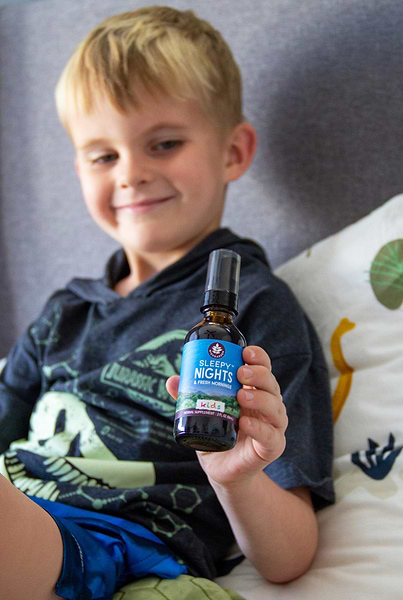
Natural Sleep Aids for Kids & Herbal Solutions for a Better Bedtime
Written by Rebecca Younger, CH, CDShare
Bedtime with kids can feel less like a peaceful wind-down and more like a test of patience. If you’ve tried the lullabies, the warm milk, the back rubs, and even your best “serious mom voice” to no avail, you’re not alone. Millions of parents are out there doing the bedtime shuffle, wondering how one small human can have so much energy.
Here’s the truth: good sleep doesn’t always show up just because the lights are off. And when kids miss out on healthy sleep habits and deep, restorative sleep, it’s not just about cranky mornings. We're talking mood swings, concentration struggles, weakened immunity. Not to mention the toll it takes on your sleep and sanity.
But here’s the good news: you’re not out of options — far from it!
Nature has a way of showing up when modern methods fall flat. For generations, parents have turned to gentle herbs to help their little ones unwind, relax, and ease into the kind of sleep that actually restores. No grogginess. No “is this even working?” Just plants doing what they do best, supporting the body, naturally.
In this guide, we’ll explore time-tested herbal sleep allies that are safe for kids and surprisingly effective. You’ll also get simple, practical tips for creating a healthy sleep cycle and bedtime routine that works with your child’s rhythm, not against it.
Let’s start by figuring out if your child actually needs sleep support, and what signs to look for.
Early Signs Your Child Needs Sleep Support
Kids aren’t always great at telling us when something’s off, especially when it comes to sleep. But their behavior often speaks volumes. If bedtime feels harder than usual, or you’ve got a little one who seems more wired than tired, here are a few common signals that they might need a bit of sleep support:
- More tantrums or emotional ups and downs
- Trouble falling asleep on their own
- Night waking, bad dreams, or restless sleep
- Pushing back on bedtime (hard)
- Extra clinginess or anxiousness when it's time to separate at night
Catching these cues early can help prevent bigger sleep struggles down the line. Once you’ve spotted them, the next step is understanding why they’re happening so you can choose the right natural sleep solutions to help your child get the rest they need.
Decoding Childhood Sleep Challenges and Their Solutions
When your kid can’t fall asleep or stay asleep, it’s more than just a tough night. It’s a tangle of emotions, habits, and hidden factors all messing with their ability to rest. But when you identify what’s at the root of the problem, you’re that much closer to finding real, lasting sleep support for your child.
Circadian Rhythm Interruptions
Your child’s circadian rhythm (aka their internal sleep-wake clock) plays a big role in how easily they fall asleep. When that rhythm gets knocked out of sync, sleep becomes a struggle. For kids, the most common culprits include:
- Inconsistent bedtimes that confuse their natural cues
- Shifts in time zones or daylight saving time
- Lack of routine, which leaves their body guessing
How to support their rhythm naturally:
- Stick to a consistent bedtime and wake-up time, even on weekends
- Get them into natural daylight during the day as it helps regulate that inner clock
Screen Time and Over-stimulation
Screens pump out blue light that tells the brain to stay awake by suppressing melatonin which is the hormone that signals sleep. And when you add in high-energy digital content and other nighttime distractions ? You’ve got a recipe for restless nights.
Why screens can mess with sleep:
- Blue light delays the body’s natural melatonin production
- Exciting or fast-paced content keeps the brain in go-mode
- Late screen time disrupts natural bedtime rhythms
Try swapping screens for a wind-down routine: story time, snuggles, bath time, or even a few quiet minutes of breathing or mindfulness. It sets the stage for a smoother transition into sleep.
Emotional and Developmental Factors
Kids are complex little creatures, emotionally, physically, and developmentally. All that change can stir up bedtime resistance or wakeful nights. You might be seeing:
- Bad dreams or bedtime fears
- Worries about school, friendships, or big transitions
- Meltdowns from separation
- Growing pains or other physical discomforts
Creating a steady, calming bedtime routine and offering space for kids to talk about their day (or their feelings) can help ease their minds and bodies into rest. Pair that with supportive herbs, and you’ve got a powerful one-two punch for better sleep, mental healthy, and emotional balance.
Environmental Sleep Disruptions
Sometimes the trouble isn’t internal, but is the environment itself. Too much light, strange noises, or an uncomfortable bed can all chip away at quality sleep. Fortunately, small changes go a long way:
- Hang blackout curtains to block light
- Try a white noise or soothing sound machine to soften sudden sounds
- Upgrade bedding to something soft, cozy, and age-appropriate
Add in a consistent bedtime rhythm and you’ve set the scene for sleep success. One that supports your child’s natural sleep cycle and your peace of mind.
Impact of Sleep Challenges
When children sleep poorly, the effects ripple throughout their day. Sleep impacts every aspect of their growth and development- physically, mentally, and emotionally.
Behavioral Changes
A child's tantrums or clinginess can intensify after a bad night's sleep. Sleep quality can significantly impact mood regulation, often leading to meltdowns, irritability, and a lower tolerance for frustration.
- Increased emotional outbursts
- Difficulty concentrating or focusing
- Reduced ability to handle stress
Ensuring consistent sleep routines not only improves their mood but also helps build resilience and supports healthy brain development.
Cognitive Performance
Deep sleep stages are crucial for brain development. During these phases, memory consolidation, problem-solving skills, and learning take place. Without adequate sleep:
- Memory Consolidation: Deep sleep helps the brain process and store new information effectively.
- Problem-Solving Skills: Critical thinking improves as the brain organizes and connects ideas during sleep.
- Focus and Learning: A lack of quality sleep makes it harder to concentrate and tackle academic challenges.
Prioritizing good sleep hygiene not only supports brain development but also enhances brain function and boosts overall mental and physical health.
Physical Health Implications
Sleep powers essential physical processes, from boosting immunity to spurring growth. Without enough of it, children may show weaker immunity, reduced energy levels, and even poor appetite regulation. Over time, chronic lack of sleep could impair long-term health trajectories.
- Stronger Immunity: Sleep helps the body fight off illnesses by strengthening the immune system.
- Energy Restoration: Adequate sleep replenishes energy levels, keeping kids active and alert.
- Growth Support: During sleep, the body releases growth hormones critical for development.
- Appetite Regulation: Sleep plays a role in controlling hunger hormones, reducing overeating risks.
- Improved Healing: Quality sleep promotes faster recovery from injuries and illnesses.
Understanding these root causes allows you to make informed decisions on tailoring bedtime strategies and herbal remedies for your child.
Nature's Gentle Sleep Allies for Children
Now that we understand what's causing sleep difficulties, let's explore "nature's pharmacy". There are gentle, effective herbal allies and sleep aids that have helped children find peaceful sleep for generations.
When the thought of little ones taking medications feels intimidating, natural sleep remedies and herbal solutions bring a gentle, natural alternative to help ease sleep struggles. These plant-based options have been trusted for generations to support relaxation and restorative sleep.
Herbal Remedies by Sleep Challenge
Not all sleep struggles are created equal, and thankfully, neither are herbs. The right herbal sleep support for your child depends on what’s actually getting in the way of their rest. Here's your mini-guide to picking the right plant-powered partner based on what your kiddo needs most.
For Winding Down and General Sleep Support
Chamomile: A Little Flower with a lot of Calm
If there were a crown for the tiniest flower with the biggest calming power, chamomile would wear it proudly. This classic bedtime herb has been the go-to for generations, gently easing everything from fussy moods to tummy troubles, both of which are notorious for wrecking a good night’s sleep. Whether it’s sipped as a warm tea, taken as a tincture, or swirled into a pre-bedtime bath, chamomile helps smooth the shift from high energy to deep Zzzs.
Milky Oat Tops: The Restlessness Reducer
Milky oat tops are like a gentle exhale for the nervous system. Rich in nutrients and deeply calming, they help soothe overstimulated kids who struggle to power down after a busy day. If bedtime feels like a game of “just one more thing,” milky oats can help take the edge off and ease the transition into sleep. Gentle enough for daily use and beloved by herbalists for supporting long-term nervous system resilience.
For Worry Brains and Repetitive Thoughts
Lemon Balm: The Mind-Quieting Botanical
An overthinking brain is no match for lemon balm. This gentle herb is a mood-balancer, nervous system soother, and all-around ally for anxious or sensitive little sleepers. It’s especially great for kids who get cranky when they’re tired, and let’s be real, that’s most of them! Bonus: lemon balm isn’t just for bedtime. A small dose during the day can help calm the crank and smooth emotional edges before things spiral. It also tastes great in teas and glycerites. If your child is on medication, check in with your healthcare provider before use.
Passionflower: The Rhythm Reset Button
If your child’s sleep patterns are all over the place or they’re riding an emotional rollercoaster by bedtime, passionflower might be a good fit. This gentle-yet-effective herb promotes calm, eases nervous system tension, and helps reset sleep rhythms that are out of sync. It’s especially helpful for kids with vivid imaginations and super active minds.
Passionflower plays well with others too! Pair it with calming allies like milky oats for an extra layer of nervous system support.
For Deeper, More Restorative Sleep
Scullcap: The Deep Sleep Companion
Scullcap is like a cozy weighted blanket for the nervous system. This under-the-radar herb shines when bedtime restlessness kicks in, helping soothe frazzled nerves and gently guide the body toward deep, restorative sleep, without the "knock-you-out" vibes. Perfect for kids who need a little help settling after a stimulating day.
Hawthorn: The Heart Helper
Hawthorn isn’t just a tonic for the heart, but it’s also a tender ally for emotional balance. For kids whose worries seem to live in their chests, hawthorn helps ease emotional tension and support a sense of calm from the inside out. While not a sedative, it brings a grounded, steady energy that makes it easier for kids to relax, unwind, and feel safe enough to sleep. Think of it as emotional first aid for little hearts and big feelings.
Ensuring Safe Herbal Support for Kids
Herbs may come from nature, but they’re not a one-size-fits-all fix, especially when it comes to tiny humans. That’s why working with kid-friendly formulas, sticking to age-appropriate dosing, and knowing what each herb brings to the table is absolutely essential. Herbal sleep support shines brightest when paired with consistency: think steady routines, cozy environments, and a real understanding of what your child actually needs.
The best part? These plant-powered allies don’t just slap a Band-Aid on sleep struggles, but they help support the body’s own rhythms and gently nudge natural patterns back into sync. Over time, that can lay the groundwork for truly restorative sleep... and maybe even a bedtime you both start to enjoy.
Stick to Kid-Friendly Products
Just a reminder: kids aren’t mini adults, and their remedies shouldn’t be either. Herbal solutions made for children are carefully crafted to match their growing bodies and unique needs. Choosing the right one helps you get the calm you're after, without the guesswork or unnecessary risks.
- Look for herbal products clearly labeled for children.
- Choose glycerites or low-alcohol formulas — both are safe when used as directed.
- A tiny amount of alcohol in a tincture won’t get your kiddo tipsy or harm their health. In fact, it helps preserve the herbs and enhance absorption.
- If you’re still unsure, you can always mix the remedy into warm water or tea as this helps dilute the taste and the alcohol content.
Quality matters here, so stick with brands that know kids and herbs. Your child’s bedtime routine (and your peace of mind) will thank you.
And remember: quality matters. Stick with trusted, reputable brands so you know exactly what’s going into those little bodies.
Pay Attention to Dosage
When it comes to herbs, more doesn’t mean better, especially with kids! Getting the right dose is key to reaping the benefits without side effects.
- Always read the dosage instructions carefully.
- Children’s doses are way smaller than adults’, so measure mindfully.
- Start low and go slow and you can always build up if needed.
Consult Your Pediatrician
While herbs are generally safe, they can still interact with medications or affect kids with specific conditions, which is why a quick check-in with your pediatrician is a smart move.
- Let your pediatrician know about any herbs or supplements you’re considering.
- Ask about possible interactions with your child’s meds or conditions.
- If your child is neurodivergent or managing unique health challenges, get extra clarity on what’s safe.
When in doubt, loop in the pros. You’ll sleep better knowing your child’s herbal routine is as safe as it is effective.
Creating Holistic Bedtime Rituals
Herbs are incredible allies, but they’re even more powerful when paired with bedtime rituals that help kids feel safe, soothed, and ready to wind down. It's not about perfection, it’s about creating rhythms that feel good and actually work.
Your child’s sleep environment and emotional state matter just as much as what’s in their cup or tincture. When we combine herbal support with consistent routines, sleep becomes less of a struggle and more of a sanctuary.
Environmental Sleep Support
Setting the stage for restful sleep means dialing in the senses and creating a cozy vibe that whispers, “It’s time to rest.” Try this:
- Temperature regulation: Keep the room slightly cool (65–70°F) to support the body’s natural sleep rhythm.
- Sensory comfort: Weighted blankets can feel like a full-body hug for kiddos who crave that grounding sensation.
- Sound management: A white noise machine can block out disruptive sounds (like the dishwasher or that neighbor’s dog).
- Lighting control: Blackout curtains + soft amber lighting = a natural cue for melatonin production.
It’s amazing how much these small shifts can create big changes in sleep quality.
Integrative Sleep Preparation Techniques
Calm doesn’t just happen. It’s something we build into the routine, gently, consistently, and lovingly.
- Mindful Movement: Whether it’s a little wiggle, some toddler yoga, or gentle stretches, helping kids release physical energy prepares their bodies for stillness.
- Breathing for Bedtime: Try a few rounds of belly breathing or bumblebee breaths (humming included!). These grounding techniques calm their nervous systems and create connection.
- Aromatherapy Bliss: Lavender, chamomile, and sandalwood can help shift the atmosphere from high-energy chaos to dreamy calm. Diffuse them, spritz a linen spray, or rub a drop on a stuffed animal’s "tummy."
- Storytime Connection: Bedtime stories aren’t just tradition, but they’re also an emotional balm. Opt for gentle adventures, magical tales, or even make up your own. It’s the perfect wind-down ritual for imaginative little minds.
These rituals don’t have to be perfect or long. What matters most is consistency and the message you send: bedtime is a safe, comforting place.
Empowering Restful Nights (With a Little Herbal Backup from WishGarden Herbs)

Here’s where your herbal toolkit really shines. Whether you’re just starting to explore plant-based remedies or you're deep into your herbal era, there’s a formula that fits your child’s needs:
- Sleepy Nights and Fresh Mornings for Kids – With calming milky oat tops and rhythm-resetting passionflower, this gentle blend is perfect for little ones who need help easing into deeper, more restful sleep.
- Quiet Time Calm and Center for Kids – Think of it as a daytime ally that supports calm and balance, setting your kiddo up for a successful snooze later. Milky oats and scullcap help soothe wired nervous systems and ease the transition from day to night.
- Growing Pains Ache Away for Kids – When growing bodies keep kids tossing and turning, this herbal blend steps in like a bedtime massage. With turmeric to soothe inflammation and chamomile to relax the whole system, it’s a gentle way to calm sore muscles and support smoother, more restful nights.
One Last Thing…
Sleepless nights don’t make you a bad parent. They make you a normal one. But with a little herbal support, some consistent rituals, and a dose of self-compassion, you can change the bedtime narrative!
Rebecca Younger is passionate about herbs and women's health. She aspires to plant seeds of inspiration within her community about plant medicine and healthier ways of life. She studied Herbal Medicine at Herbalism Roots in Denver and is a certified Doula through the Matrona Foundation. She is the Brand Communications Specialist at WishGarden Herbs.
For educational purposes only. This information has not been evaluated by the Food and Drug Administration. This information is not intended to diagnose, treat, cure, or prevent any disease, or to sell any product.


















